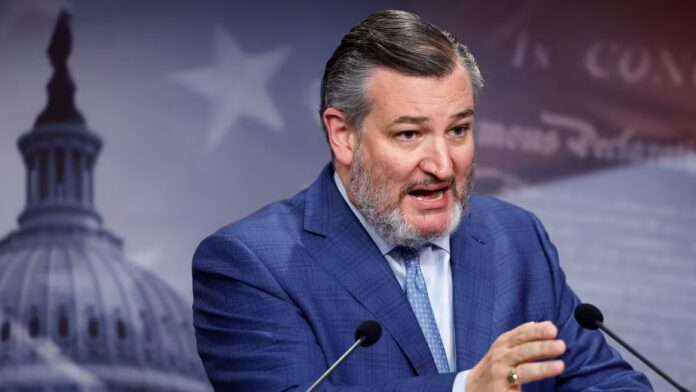United States Senator Ted Cruz has accused the Nigerian government of enabling policies that encourage attacks on Christians, alleging that Nigerian authorities are focused more on media image and public relations than addressing the violence. Cruz made the claims in a statement posted on his X (formerly Twitter) account on Friday, adding new tension to an already sensitive international debate about religious freedom in Nigeria.
Cruz, a Republican senator from Texas and a long-time critic of global religious persecution, said Nigerian officials are aware of the internal policies that have created what he describes as an unsafe environment for Christians. He accused the government of tolerating religious extremism and failing to stop attacks carried out by violent groups in different parts of the country.
The senator stated, citing attention from Fox News Digital, that the Nigerian government is not ignorant of the situation.
“Nigerian officials know their policies have created an environment in which Christians are being persecuted and slaughtered, including their enforcement of sharia law and their tolerance of Islamist violence,” Cruz said.
He argued that rather than reversing these policies or taking firm action against extremist groups, Nigerian authorities have chosen to invest in what he described as media manipulation.
“Instead of reversing these policies, they are waging a media campaign to escape exposure and accountability. I intend to prevent them from doing so,” the statement read.
Cruz did not specify the steps he plans to take, but his comments indicate that he may push for stronger US action or congressional scrutiny on Nigeria’s human rights record.
Cruz’s comments come days after Nigeria’s Minister of Foreign Affairs, Yusuf Tuggar, appeared on Piers Morgan Uncensored to address global allegations of Christian persecution. Tuggar strongly rejected claims that Nigerian Christians are being targeted systematically, arguing instead that the violence in Nigeria affects people of all religions and ethnic groups.
He said that criminal gangs, bandits, and extremist groups attack both Muslims and Christians, and insisted that the government has been working to improve security and support affected communities. Tuggar also argued that some international reports are exaggerated or based on misinformation.
However, critics say these statements appear to be part of a renewed international public relations effort by the Nigerian government to shape global perception as pressure increases from Western political and religious groups.
The debate about religious persecution in Nigeria is not new. The country, with a population split nearly evenly between Muslims and Christians, has witnessed recurring violence linked to banditry, farmer-herder clashes, terrorism, and community disputes.
In northern states where sharia law is implemented as part of local governance, critics like Cruz argue that Christians face discrimination. The Nigerian government has repeatedly denied this, insisting that sharia courts operate only for willing Muslims and do not apply to Christians.
Attacks by extremist groups such as Boko Haram and Islamic State West Africa Province (ISWAP) have targeted both Muslims and Christians, although churches, priests, and Christian communities have frequently been attacked over the years. Bandit groups in northwestern states have also kidnapped pastors and worshippers, fuelling concerns about religiously motivated violence.
Cruz’s comments come shortly after US President Donald Trump placed Nigeria on a list of “countries of particular concern”—a designation applied to nations accused of violating religious freedoms. Trump’s listing of Nigeria has renewed pressure on US policymakers to adopt stronger action.
Trump accused the Nigerian government of failing to protect religious minorities and referred to what he called “ongoing violence against Christians.” He claimed the situation had reached a point where the US Department of Defense should prepare for “possible military action” if Nigeria continues to “allow the killing of Christians.”
The Nigerian government has strongly denied allegations of Christian genocide or targeted persecution. Officials argue that violence in Nigeria is driven more by economic hardship, criminal activities, and local disputes than by religious motives. They also highlight that thousands of Muslims have been killed in attacks by extremist groups and bandits.
Government spokespersons say Nigeria is working to improve security nationwide, pointing to recent military operations against Boko Haram, bandits, and kidnappers. They also stress that both Christians and Muslims serve in high-ranking security positions, which they say reflects the country’s commitment to religious inclusion.
Cruz’s accusations add to a developing diplomatic challenge for Nigeria, which is working to maintain strong relations with the United States. The US is one of Nigeria’s biggest development and security partners, providing military equipment, humanitarian support, and economic assistance.
However, human rights concerns have repeatedly strained the relationship, with US lawmakers often calling for Nigeria to be sanctioned or placed under closer monitoring.
As Nigeria continues to battle insecurity in many parts of the country, the debate about religious persecution is likely to intensify. International attention, especially from influential figures like Cruz and Trump, ensures that the issue will remain under scrutiny.
For now, the Nigerian government insists that it is being unfairly portrayed, while critics argue that the country must do more to protect vulnerable communities.

